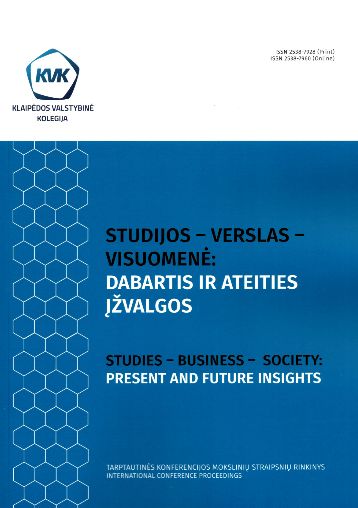ORGANIZING PEDAGOGICAL EDUCATION FOR PARENTS WITH PRE-SCHOOL CHILDREN WITH SPECIAL NEEDS
DOI:
https://doi.org/10.52320/svv.v1iVII.242Keywords:
Interactions, pedagogical education of parents, children with special educational needsAbstract
When a child starts attending a preschool educational institution, both educators become significant in the process of his education: the family and the teacher. The forms of interaction between teachers and parents are communication, joint activities, and organizational methods. The analysis of psychological and pedagogical literature revealed that the problem of interaction between the family and the preschool educational institution is widely discussed. Very often, parents of children with special educational needs expect quick educational results and progress. An inseparable condition for successful interaction is educational activity. Therefore, the main goal of the interaction between teachers and families is to establish a relationship based on trust with parents, to develop the need to share their problems with each other and to solve them together. Pedagogical education of parents is traditionally considered one of the forms of interaction between the family and the educational institution, it is perceived as the successful inclusion of parents in the educational process, the opportunity for them to participate in educational processes and to acquire the necessary pedagogical knowledge regarding the education of children with special educational needs.
The problem of the research:
- How do parents of children with special educational needs value the importance of communication with the pedagogue regarding the child's education?
- What do parents see as the most important forms of pedagogical education and organized joint activities for interaction with teachers?
The object of the research: is pedagogical education of parents of children with special educational needs in a preschool educational institution.
The aim of the research:
Research tasks: to analyse the interaction between family and teachers in organizing the pedagogical education of parents of children with special educational needs in a pre-school educational institution.
The methods of the research:
- Critical analysis of scientific literature.
- Oral survey (semi-structured interview).
- Content analysis.
The research sample. The sample of the qualitative study consists of 5 informants who agreed to participate in the research - parents of children with special educational needs attending a preschool education institution. The research sample is convenience non-probability.
The results of the research. The analysis of the data of the qualitative research made it possible to identify the forms of interaction: mutual communication between education participants (parents, teachers), joint activities and methods of organization. Parents' communication with the pedagogue makes it possible to achieve the results of interaction, conversation, questioning, support, information and communication to jointly solve the educational problems of a child with special educational needs, for the participants of the education to get to know each other better and to meet the parents' expectations. In this case, the interaction between parents and educators becomes relevant when organizing pedagogical education in those issues that become relevant for parents: communication of a child with special educational needs with peers, language, attention, behaviour. The obtained research data revealed that teachers in the preschool educational institution use forms of information delivery that partially help meet parents' expectations: classes are organized with practical examples, video footage is shown, which parents can analyse with educational support specialists. Valuable individual teacher consultations, where experiences about child education are shared through interaction. The research revealed that there is a lack of more innovative forms of information delivery, i.e., participation of parents in open door days, joint projects, thematic activities where they could learn more about child education, help with learning. Electronic newsletters, parent groups on social networks, more frequent communication using smart device apps could also help to stay away from the life of the educational institution. Their variety and appropriate use would allow parents and educators to interact more actively, to achieve the common goal of quality education of children and mutual cooperation. The important participation of parents in various educational events, group activities, and the educational process helps children to adapt to new situations more easily. The research revealed that being together with the children in an environment important to them, participating in various activities helps the parents of pre-schoolers to get to know their children better in different environments. By getting involved in activities, parents can spend more time together and enjoy joint work. This raises the child's self-esteem, self-confidence and educational achievement and progress. There are quite a lot of forms of cooperation between educators and parents, their proper use and active participation in activities allows parents and educators to actively interact in order to achieve the common goal of quality education of children and mutual cooperation.
Downloads
Published
How to Cite
Issue
Section
License
Copyright (c) 2022 Jūratė Klizaitė, Aniuta Varneckienė, Aurelija Valaitienė

This work is licensed under a Creative Commons Attribution 4.0 International License.
Individual articles are published Open Access under the Creative Commons Licence CC-BY 4.0, which permits unrestricted use, distribution, and reproduction in any medium, provided the original author and source are credited. Authors retain copyright in their articles, but grant Klaipėdos valstybinė kolegija the right of the first publication.

